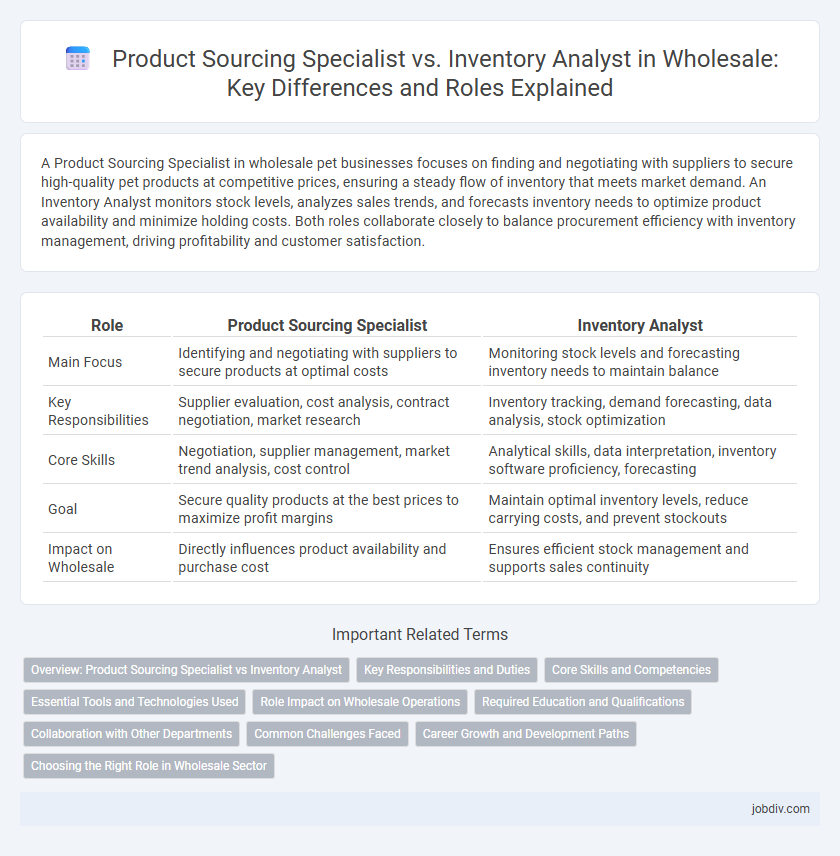A Product Sourcing Specialist in wholesale pet businesses focuses on finding and negotiating with suppliers to secure high-quality pet products at competitive prices, ensuring a steady flow of inventory that meets market demand. An Inventory Analyst monitors stock levels, analyzes sales trends, and forecasts inventory needs to optimize product availability and minimize holding costs. Both roles collaborate closely to balance procurement efficiency with inventory management, driving profitability and customer satisfaction.
Table of Comparison
| Role | Product Sourcing Specialist | Inventory Analyst |
|---|---|---|
| Main Focus | Identifying and negotiating with suppliers to secure products at optimal costs | Monitoring stock levels and forecasting inventory needs to maintain balance |
| Key Responsibilities | Supplier evaluation, cost analysis, contract negotiation, market research | Inventory tracking, demand forecasting, data analysis, stock optimization |
| Core Skills | Negotiation, supplier management, market trend analysis, cost control | Analytical skills, data interpretation, inventory software proficiency, forecasting |
| Goal | Secure quality products at the best prices to maximize profit margins | Maintain optimal inventory levels, reduce carrying costs, and prevent stockouts |
| Impact on Wholesale | Directly influences product availability and purchase cost | Ensures efficient stock management and supports sales continuity |
Overview: Product Sourcing Specialist vs Inventory Analyst
A Product Sourcing Specialist focuses on identifying, evaluating, and negotiating with suppliers to secure high-quality products at competitive prices, optimizing the supply chain for wholesale businesses. An Inventory Analyst monitors stock levels, forecasts demand, and analyzes sales data to ensure optimal inventory management and reduce carrying costs. Both roles collaborate closely to balance product availability with cost efficiency, driving overall profitability in wholesale operations.
Key Responsibilities and Duties
Product Sourcing Specialists manage supplier relationships, negotiate contracts, and identify cost-effective, high-quality products to ensure a steady supply chain. Inventory Analysts monitor stock levels, analyze inventory data, and forecast demand to optimize inventory turnover and reduce carrying costs. Both roles collaborate closely to balance procurement efficiency with accurate inventory management in wholesale operations.
Core Skills and Competencies
Product Sourcing Specialists excel in supplier negotiation, market research, and strategic cost reduction, ensuring optimal product procurement in wholesale operations. Inventory Analysts focus on data analysis, demand forecasting, and stock accuracy to maintain efficient inventory turnover and minimize holding costs. Both roles require strong analytical abilities, attention to detail, and proficiency in supply chain management software for effective wholesale performance.
Essential Tools and Technologies Used
Product Sourcing Specialists leverage supplier management platforms, market intelligence software, and procurement automation tools to identify and secure cost-effective, high-quality products. Inventory Analysts rely heavily on inventory management systems, demand forecasting software, and data analytics platforms to optimize stock levels and reduce carrying costs. Both roles utilize ERP systems, but sourcing specialists focus on supplier data integration while analysts emphasize real-time inventory tracking and predictive analytics.
Role Impact on Wholesale Operations
A Product Sourcing Specialist directly influences wholesale operations by identifying and securing cost-effective suppliers to ensure a steady supply of high-demand products. Inventory Analysts optimize stock levels through data-driven forecasting and inventory management, reducing holding costs and minimizing stockouts. Both roles collaboratively enhance operational efficiency and profitability in wholesale distribution.
Required Education and Qualifications
A Product Sourcing Specialist typically requires a bachelor's degree in supply chain management, business, or a related field, alongside strong negotiation and market research skills. An Inventory Analyst often holds a degree in logistics, business administration, or data analytics, emphasizing proficiency in inventory management software and quantitative analysis. Certifications such as CPSM (Certified Professional in Supply Management) benefit Product Sourcing Specialists, while Inventory Analysts may pursue CPIM (Certified in Production and Inventory Management) to enhance their credentials.
Collaboration with Other Departments
A Product Sourcing Specialist collaborates closely with procurement, sales, and marketing teams to identify supplier options and negotiate terms that align with company goals. An Inventory Analyst works with logistics, warehouse, and finance departments to ensure accurate stock levels and optimize supply chain efficiency. Both roles require ongoing communication and data sharing to synchronize product availability with market demand and operational capacity.
Common Challenges Faced
Product Sourcing Specialists and Inventory Analysts both face challenges such as demand forecasting inaccuracies, leading to overstock or stockouts that disrupt supply chains. Managing supplier reliability and lead time variability adds complexity to product availability and inventory turnover rates. Both roles require balancing cost efficiency with maintaining optimal stock levels to support seamless wholesale operations.
Career Growth and Development Paths
A Product Sourcing Specialist focuses on identifying and securing suppliers to optimize product cost and quality, developing strong negotiation and market research skills crucial for advancing into procurement management or supply chain leadership roles. An Inventory Analyst specializes in tracking stock levels, analyzing inventory data, and improving forecasting accuracy, which establishes a solid foundation for progression into inventory control management or operations strategy positions. Both careers offer distinct pathways in wholesale, with the former emphasizing external supplier relations and the latter focusing on internal inventory optimization for scalable business growth.
Choosing the Right Role in Wholesale Sector
A Product Sourcing Specialist excels at identifying suppliers, negotiating deals, and ensuring product quality, directly impacting cost-efficiency and product availability in wholesale operations. An Inventory Analyst focuses on managing stock levels, analyzing sales data, and forecasting demand to optimize inventory turnover and reduce holding costs. Choosing the right role depends on whether your priority is securing optimal supplier partnerships or maintaining balanced inventory for seamless distribution in the wholesale sector.
Product Sourcing Specialist vs Inventory Analyst Infographic

 jobdiv.com
jobdiv.com